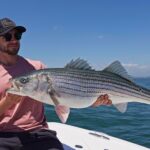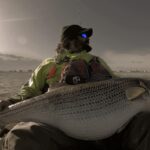
We Stand on the Shoulders of Giants.
Photo Credit: Guiding Flow TV The fishing industry has lost an icon. The family and
As many of you know, ASGA is currently supporting a campaign to drive thoughtful, productive comments to reform commercial menhaden gear usage in shallow water off the coast of Virginia. If you want to learn more about the specifics of that campaign, click here. Once you’ve got the full scoop, you can head here to submit your own comment. The comment submission total was around 200 when we launched our first blog. The Virginia Regulatory Townhall website now reads over 800 – and continues to boom as the community rallies and amplifies its unified voice. In this blog, we’ll take to the sky with a certified drone pilot who has seen first-hand (well, technically through a controller) the value of coastal forage fish.
We recently launched a social post for the VA menhaden campaign using footage of menhaden-based blitzes further up the coast from the talented Sutton Lynch. Known for insanely captivating drone footage posts on social media, Sutton provides the community with an aerial view of the beauty of abundance. For example, a pack of school-bus-sized bluefin tuna feeding on a school of bunker or humpback whales indulging a coastal buffet. Collaborating with this talented drone pilot and artist was a no-brainer when trying to show the fishing community at large the value of healthy forage fish populations. We connected with Sutton to get our hands on some epic drone shot files and learn a little bit more about this passion for documentation via aviation:
“I was born and raised in East Hampton, New York. My life, especially in the warmer months, has always been centered around the ocean. I love documenting new species and new encounters; seeing animals interact with each other or the ocean in ways I haven’t seen or known about before is always an incredible learning experience. Every day is a lesson in ecology”, said Lynch. “The drone introduces a dimension of the ocean I wouldn’t be privy to otherwise. The aerial perspective allows me to document fish and mammals without interfering and provides access to the ocean you just can’t get from a boat or the beach.”
One of the dynamics that makes fisheries and marine management difficult is the sheer scale of the habitats – not to mention that they exist below the water. Few receive the same perspective as someone flying above the ocean with crisp resolution on a daily basis. Lynch has seen the impact of the increasing coastal abundance of menhaden in his years piloting the drone:
“The sheer scale of the Menhaden schools blows my mind, and since their return, the ocean has radically changed for the better. Besides watching whales feed, the most exhilarating scenes I’ve documented involving menhaden have been bluefish blitzes. These blitzes demonstrate the power and chaos of nature in the most remarkable way I never knew possible.”
Sutton’s emphasis on the value of menhaden does not go understated. “From what I’ve watched and documented, menhaden are the single most important fish in the food chain. The bluefish, dolphins, whales, sharks, marlin and other life wouldn’t be here without them. Their health and security relies on menhaden.”
There couldn’t be a better time to look further up the coast at the sheer scale and impact of healthy forage fish populations while Virginia stakeholders rally to amplify their voices and protect their shallow water benthic ecosystems.
A key component of every large-scale fishery is using the gear in the manner it was intended. For those not familiar with the menhaden reduction purse seine fishery, the diagram below shows how the gear should be used. Conceptually, the bottom of the net is open and allows non-targeted species to escape before the “purse” is drawn closed. Proper use of the gear is a key component of the controversial menhaden reduction fishery and the Marine Stewardship Council sustainability Certification under which they operate. The vertical net curtain is about 50’ to 60’ in length with the total net length being 1400’-1500’.

The use of these nets in water shallower than 60 feet has drastically different implications. The curtains are now lying on the bottom instead of hanging vertically. In layman’s terms: the escape hatch at the bottom is closed and there is no exit for non-targeted marine life. Additionally, the net is making contact with the bottom, causing additional damage and interfering with benthic (bottom) habitat. The Chesapeake is already plagued with a whole dinner menu of issues with SAV, oysters, clams and other benthic fauna. The additional impact of heavily-weighted curtains being dragged across the bottom is very real.
The situation at face level appears pretty cut and dry: this gear is not designed to be used in less than 60′ of water, so let’s not allow that to happen. If you agree with common sense community action to conserve our resources, here is your chance to help. An online petition has been established in Virginia. This is a legitimate state process in Virginia that is the first step in getting new fisheries regulations. The petition is specifically for purse seines and their use in shallow waters.
You can view the complete petition by clicking here. The comment period for this petition ends on August 21, 2023. You can submit your comment by clicking here.
Since our last blog on the topic on August 7th, over 600 new public comments have been submitted. We need to keep up the momentum.
The next time you’re on Instagram scrolling for your fix of fishy content , give @SuttonLynch a follow up. You won’t regret it.

Photo Credit: Guiding Flow TV The fishing industry has lost an icon. The family and

Earlier this summer, the Jack Project took another big step forward. On the waters of

Fisheries management along the Atlantic coast is a mess, and the Atlantic States Marine Fisheries

Striped bass anglers from Maine to Virginia have spent years navigating shifting regulations meant to
We rely on our members and donations to keep fighting for a sustainable tomorrow in marine conservation.
GIVE THE GIFT OF FISHERIES CONSERVATION THIS HOLIDAY SEASON. SHOP ASGA GOODS THAT FUND FISHERIES RESEARCH & ADVOCACY CAMPAIGNS
JOIN ASGA IN CALLING FOR CRITICAL MANAGEMENT ACTION AFTER YEARS OF SPAWN FAILURES & POOR MANAGEMENT.
By using this website, you agree to our use of cookies. We use cookies to provide you with a great experience and to help our website run effectively. To learn more, please review our privacy policy.